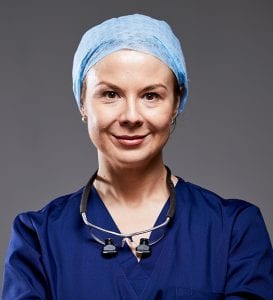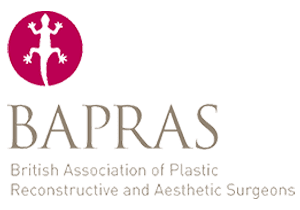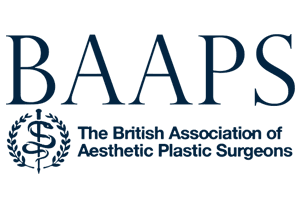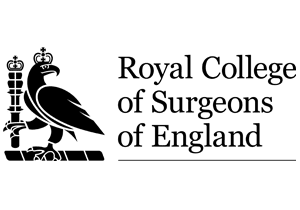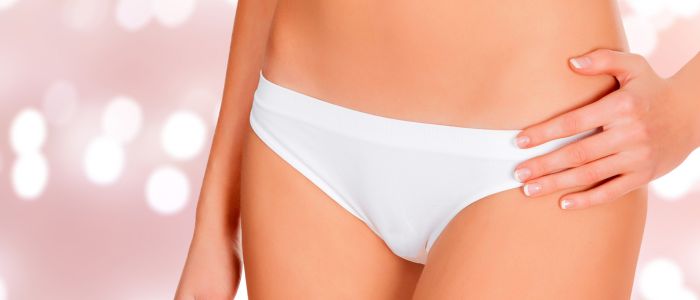
Table of Contents
- Effective Strategies for Addressing Sagging Vulva
- Download Anca Breahna’s Labiaplasty Guide
- What Is a Sagging Vulva?
- What Causes a Sagging Vulva?
- Symptoms and Signs
- Psychological and Physical Implications
- Treatment Options for Sagging Vulva
- Non-surgical Treatments
- Surgical Treatments
- Innovative Treatments
- Choosing the Right Treatment for Sagging Vulva
- FAQs about Treatment and Solutions for Sagging Vulva
- Further Reading about Procedures at Cheshire Cosmetic Surgery
Effective Strategies for Addressing Sagging Vulva
A sagging vulva – this sensitive topic is more common than you might think, and it’s important to address not only for aesthetic reasons but also for your personal comfort and health.
In this blog, Consultant Plastic Surgeon Anca Breahna, a respected plastic and reconstructive surgeon based in the UK, will guide you through the different options available to rejuvenate both your body and confidence. With years of experience and a compassionate approach, Anca understands the physical and emotional impact this issue can have on your life.
Whether you’re exploring preventative measures, considering non-invasive solutions, or thinking about surgical options, this post is designed to provide you with complete and empathetic insights. The goal is to help you make informed decisions and find a treatment path that best suits your needs and lifestyle.
Download Anca Breahna’s Labiaplasty Guide
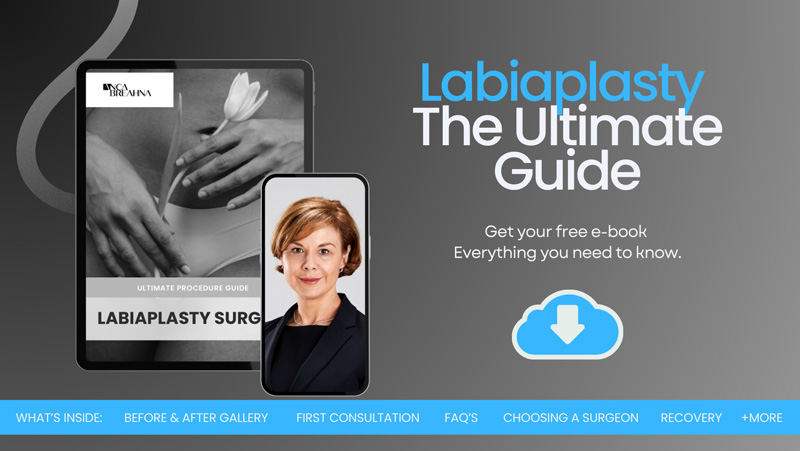
What Is a Sagging Vulva?
A sagging vulva refers to the loss of firmness and elasticity around the vulvar region, which includes the labia majora and minora, the clitoris, and the vaginal opening. This condition is not uncommon as you age, but it can also be influenced by factors like childbirth, hormonal changes, and genetics.
What Causes a Sagging Vulva?
The vulva is rich in collagen and elastin, which are proteins that maintain skin elasticity and firmness. Over time, these proteins can degrade, leading to changes in the appearance and feel of the vulvar area. Here are some common causes:
- Ageing: As you age, your skin naturally loses some of its elasticity. This can affect all areas of the body, including the vulva.
- Childbirth: Vaginal deliveries can stretch the muscles and the skin of the vulva, sometimes resulting in lasting changes. Learn more about vaginal rejuvenation after pregnancy and the available treatment options.
- Hormonal Changes: Menopause is a significant time of hormonal change for women, as reduced oestrogen levels can lead to decreased collagen production and skin elasticity.
- Genetic Factors: Just as with other physical characteristics, your genes can play a role in how your skin ages, including the skin around the vulva.
Symptoms and Signs
Aside from the noticeable sagging or loosening of the skin, you might also experience discomfort during physical activities or while wearing tight clothing. Some women report an increase in urinary tract infections (UTIs) as the architecture of the vulvar area changes, potentially affecting hygiene.
Psychological and Physical Implications
- Emotional Impact: Many women feel embarrassed or anxious about the changes in their body’s appearance, which can significantly impact self-esteem and confidence. It’s not unusual for this to affect intimacy and relationships, as feelings of attractiveness and femininity are intertwined with physical appearance for many.
- Physical Discomfort: In some cases, a sagging vulva can lead to physical discomfort. You might experience irritation from clothing, discomfort during sex, or general discomfort due to the increased exposure and friction of the vulvar tissues. Managing these symptoms is not only a matter of comfort but also of health, as persistent irritation can lead to skin infections or worsen existing urinary issues.
Treatment Options for Sagging Vulva
When it comes to treating a sagging vulva, there are several options ranging from lifestyle adjustments to surgical interventions. Anca is committed to providing tailored advice that considers your specific circumstances, overall health, and personal preferences.
Non-surgical Treatments
- Lifestyle Changes: Sometimes, simple changes can help improve the tone and health of your vulvar region. Maintaining a healthy weight can reduce pressure on the pelvic floor, while regular physical activity can improve overall muscle tone. Eating a diet rich in vitamins C and E might also help by boosting collagen production. For a concise overview of practical solutions, see our Solutions for a Sagging Vulva for quick tips and advice.
- Pelvic Floor Exercises: Also known as Kegel exercises, these can strengthen the muscles around the vagina and improve some aspects of a sagging vulva. While they won’t completely reverse the condition, they can help alleviate some symptoms and prevent further progression.
Surgical Treatments
- Labiaplasty: This surgical procedure involves reshaping or reducing the labia minora or majora to improve the appearance of the vulva. It can alleviate discomfort caused by excess tissue and restore your confidence in your body’s appearance.
- Vaginoplasty: This operation tightens the vagina, which can be beneficial for those who feel that sagging has affected their vaginal canal. Vaginoplasty might be considered in conjunction with labiaplasty for comprehensive results.
- Combination Therapies: Depending on your situation, Anca might suggest a combination of treatments to achieve the best results. This approach can address both aesthetic concerns and physical discomfort.
Innovative Treatments
- Laser Therapy: Recent advancements include the use of laser technology to tighten vulvar and vaginal tissues non-invasively. This treatment can stimulate collagen production, improving elasticity and firmness without the need for surgery.
- Radiofrequency Treatments: Similar to laser therapy, radiofrequency uses energy waves to heat deep layers of tissue, encouraging new collagen growth and tightening the skin. This can be a gentle alternative to surgery with minimal downtime.
Choosing the Right Treatment for Sagging Vulva
Making a decision about how to treat a sagging vulva requires careful consideration of different factors including your personal health, the severity of the condition, your lifestyle, and your expectations. Anca is dedicated to guiding you through this sensitive process with professionalism and empathy. Here’s how you can expect the consultation and treatment selection to unfold:
Initial Consultation
Your journey towards finding the right treatment starts with a comprehensive initial consultation. During this meeting, Anca will conduct a thorough medical assessment, which may include a physical examination, to understand the extent of sagging and any associated symptoms. This is a great opportunity for you to discuss your medical history, any previous treatments you’ve undergone, and your expectations from the treatment. Anca believes in the importance of patient education, so expect to receive detailed explanations about potential treatment paths and their outcomes.
Discussing Your Goals
Understanding your aesthetic and physical comfort goals is essential in selecting the appropriate treatment. Are you looking for a solution to physical discomfort, aesthetic improvement, or both? Anca will help you set realistic expectations based on your individual condition and the latest treatment advancements. This personalised approach ensures that the chosen treatment aligns with your personal values and lifestyle needs.
Personalized Treatment Plans
Based on the initial consultation and your specific needs, Anca will develop a personalised treatment plan. This plan may include one or more of the following options:
- Non-Surgical Approaches: If your symptoms are mild, Anca might suggest non-surgical methods first. These can include pelvic floor exercises to strengthen the area, lifestyle changes to alleviate symptoms, or non-invasive procedures like laser therapy or radiofrequency treatments to improve tissue firmness and elasticity.
- Surgical Options: For more pronounced symptoms or if you are seeking significant cosmetic changes, surgical options like labiaplasty or vaginoplasty might be recommended. Anca will explain the procedures in detail, including what you can expect during and after surgery, the recovery process, potential risks, and the likely outcomes.
- Combination Treatments: Often, a combination of treatments works best to achieve optimal results. For instance, you might benefit from a vaginoplasty complemented by laser therapy to maximise the aesthetic and functional improvements.
Understanding the Procedures
Anca ensures that you have a full understanding of any suggested procedures. This includes how they are performed, the kind of anaesthesia used, the expected recovery time, and any potential risks and complications. She uses visual aids, diagrams, and before-and-after photos of past patients (with their consent) to provide a clear picture of what can be achieved.
What to Expect During Recovery
Recovery varies depending on the treatment performed. Non-invasive treatments usually have minimal downtime, allowing you to return to daily activities relatively quickly. Surgical treatments, however, may require a period of rest and limited activity. Anca will provide detailed post-operative care instructions and support to ensure your recovery is as smooth and comfortable as possible.
Long-Term Care and Follow-up
Effective treatment doesn’t end after the procedure. Anca offers complete follow-up care to monitor your recovery and the success of your treatment. This may involve several post-treatment visits to assess the healing process and address any concerns you might have. Additionally, she will advise on long-term care strategies to maintain the results and manage any future symptoms.
Throughout your consultations, Anca encourages questions and open dialogue. She believes that an informed patient is more likely to be satisfied with the outcomes of their treatment. Therefore, she provides ample information and supports you through the decision-making process with professional advice and empathy.
Choosing the right treatment for a sagging vulva involves careful planning and consideration of all available options. With Anca’s expert guidance, you can make an informed decision that best meets your needs and leads to improved well-being and confidence.
FAQs about Treatment and Solutions for Sagging Vulva

What are the most effective non-surgical treatments for a sagging vulva?
Non-surgical treatments can be quite effective depending on the extent of sagging and individual body responses. Lifestyle modifications such as maintaining a healthy weight and regular physical activity can improve muscle tone and skin elasticity. Pelvic floor exercises are recommended to strengthen the muscles around the vagina and potentially lift the sagging vulva. Additionally, laser therapy and radiofrequency treatments are modern options that stimulate collagen production and can tighten the vulvar area without the need for surgery.
How do I know if I need surgery for a sagging vulva?
The decision to opt for surgery often depends on the severity of the sagging and the associated symptoms. If non-surgical treatments have not provided satisfactory results or if the sagging significantly affects your quality of life (e.g., causing discomfort, affecting sexual health, or leading to recurrent infections), surgery might be recommended. Consultation with a specialist like Anca is essential to evaluate your condition thoroughly and discuss potential surgical options such as labiaplasty or vaginoplasty.
What can I expect from a recovery after vulvar surgery?
Recovery after vulvar surgery varies based on the specific procedure performed. Generally, patients can expect some soreness and swelling in the treated area for the first few weeks. You might be advised to take it easy and avoid strenuous activities, including sexual intercourse, for approximately 4-6 weeks. Anca will provide detailed post-operative care instructions and schedule follow-up appointments to ensure your recovery is progressing well.
Are there any risks associated with treatments for sagging vulva?
As with any medical procedure, there are potential risks involved. Non-surgical treatments like laser and radiofrequency might cause temporary discomfort, redness, or swelling. Surgical treatments, while generally safe when performed by a qualified surgeon like Anca, can include risks of infection, bleeding, or adverse reactions to anaesthesia. During your consultation, Anca will discuss all potential risks and how they are mitigated in her practice.
How long do the results of vulvar tightening last?
The longevity of results from vulvar tightening treatments can vary. Non-surgical methods such as laser and radiofrequency typically require periodic sessions to maintain results. Surgical options tend to provide more durable outcomes, but it’s important to note that natural ageing and factors such as weight fluctuations or hormonal changes can affect the longevity. Anca will provide a realistic overview of what you can expect in terms of results duration and discuss how to maintain your outcomes through lifestyle choices and possible follow-up treatments.
Medical References about Sagging Vulva
- Vulvovaginal Atrophy – PMC
- Aging Changes in the Female Reproductive System – Med Line Plus
- Loose vagina: Myths and facts – Medical News Today
- Labia Minora Hypertrophy: Causes, Symptoms, and Treatment – WebMD
- Vaginal Rejuvenation: Treatment, Purpose & Procedures – Cleveland Clinic
Further Reading about Procedures at Cheshire Cosmetic Surgery
- Read more about Labiaplasty Types – Trim Labiaplasty and Wedge Labiaplasty or Hybrid
- Read more about Labiaplasty vs Vaginoplasty
- Read more about Scars after Labiaplasty
- Read more about Recovery after Labiaplasty
- Read more about Exercise after Labiaplasty


